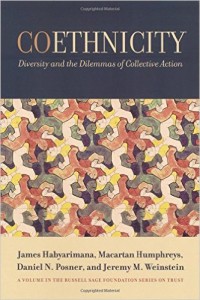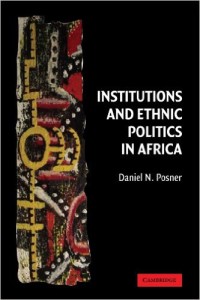 Coethnicity: Diversity and the Dilemmas of Collective Action
Coethnicity: Diversity and the Dilemmas of Collective Action
(Russell Sage Foundation Press, 2009)
with James Habyarimana, Macartan Humphreys and Jeremy Weinstein
Ethnically homogeneous communities often do a better job than diverse communities of producing public goods such as satisfactory schools and health care, adequate sanitation, and low levels of crime. Coethnicity reports the results of a landmark study that aimed to find out why diversity has this cooperation-undermining effect. The study, conducted in a neighborhood of Kampala, Uganda, notable for both its high levels of diversity and low levels of public goods provision, hones in on the mechanisms that might account for the difficulties diverse societies often face in trying to act collectively. The analysis uses behavioral games to explore how the ethnicity of the person with whom one is interacting shapes social behavior. We recruited hundreds of local participants who interacted with various partners in laboratory games simulating real-life decisions involving the allocation of money and the completion of joint tasks. The results of several of these games debunk long-standing explanations for diversity’s adverse effects. Contrary to the prevalent notion that shared preferences facilitate ethnic collective action, we find differences in goals and priorities among participants not to be structured along ethnic lines. Nor do we find evidence that subjects favored the welfare of their coethnics over that of non-coethnics. When given the opportunity to act altruistically, individuals did not choose to benefit coethnics disproportionately when their actions were anonymous. Yet when anonymity was removed, subjects behaved very differently. With their actions publicly observed, subjects gave significantly more to coethnics, expected their partners to reciprocate, and expected that they would be sanctioned for a failure to cooperate. This effect was most pronounced among individuals who were otherwise least likely to cooperate. These results suggest that what may look like ethnic favoritism is, in fact, a set of reciprocity norms—stronger among coethnics than among non-coethnics—that make it possible for members of more homogeneous communities to take risks, invest, and cooperate without the fear of getting cheated. Such norms may be more subject to change than deeply held ethnic antipathies—a powerful finding for policymakers seeking to design social institutions in diverse societies.
winner of the 2010 Luebbert Prize for the best book in Comparative Politics
 Institutions and Ethnic Politics in Africa
Institutions and Ethnic Politics in Africa
(Cambridge University Press, 2005)
This book presents a theory to account for why and when politics revolves around one axis of social cleavage instead of another. It does so by examining the case of Zambia, where people identify themselves either as members of one of the country’s six dozen tribes or as members of one of its four principal language groups. The book accounts for the conditions under which political competition in Zambia revolves around tribal differences and the conditions under which it revolves around language group differences. Drawing on a simple model of identity choice, it shows that the answer depends on whether the country is operating under single-party or multi-party rule. During periods of single-party rule, tribal identities serve as the axis of electoral mobilization and self-identification; during periods of multi-party rule, broader language group identities play this role. The book thus demonstrates how formal institutional rules determine the kinds of social cleavages that matter in politics.
winner of the 2006 Luebbert Prize for the best book in Comparative Politics and the 2006 African Politics Conference Group Best Book Award